Reflective Essay on Emotional & Cultural Intelligence in MBA502
VerifiedAdded on 2022/10/06
|7
|1526
|26
Essay
AI Summary
This essay provides a comprehensive self-assessment of emotional and cultural intelligence, focusing on the student's strengths and weaknesses in relation to leadership and diversity. The student completed the Global Leadership Foundation’s Global Emotional Intelligence Test and Daniel Goleman’s EQ test, and gathered assessments from two peers. The essay compares the results of these tests, identifies areas for improvement in emotional intelligence, and applies the Johari Window model to analyze the findings. The analysis highlights skills in self-management and social awareness, while recognizing a need for improvement in relationship management. The essay concludes with a discussion of how to develop competencies in emotional intelligence and the importance of cultural knowledge in a globalized environment. The assignment fulfills the requirements of the MBA502 course, demonstrating an understanding of emotional intelligence and its impact on professional development.
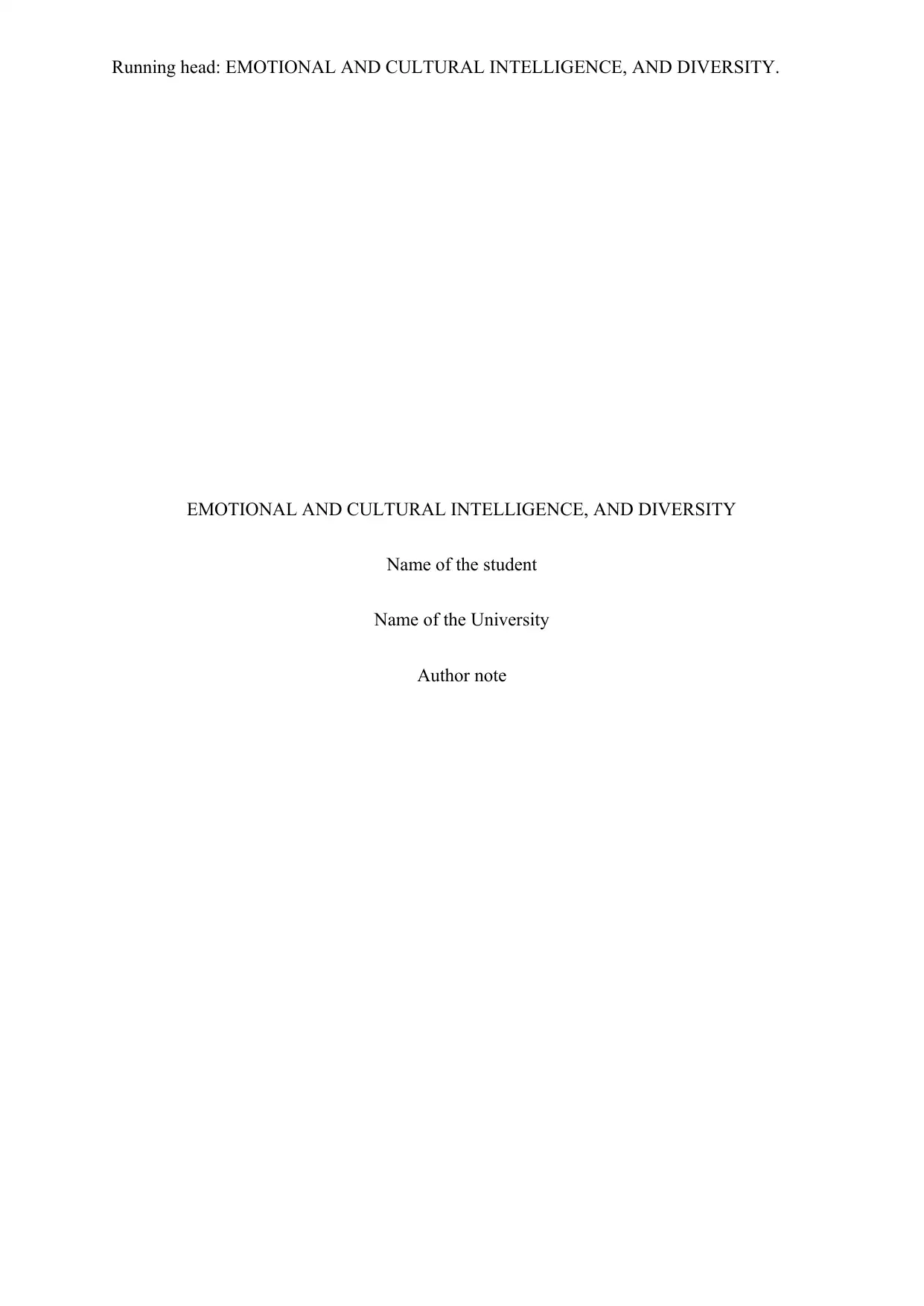
Running head: EMOTIONAL AND CULTURAL INTELLIGENCE, AND DIVERSITY.
EMOTIONAL AND CULTURAL INTELLIGENCE, AND DIVERSITY
Name of the student
Name of the University
Author note
EMOTIONAL AND CULTURAL INTELLIGENCE, AND DIVERSITY
Name of the student
Name of the University
Author note
Paraphrase This Document
Need a fresh take? Get an instant paraphrase of this document with our AI Paraphraser
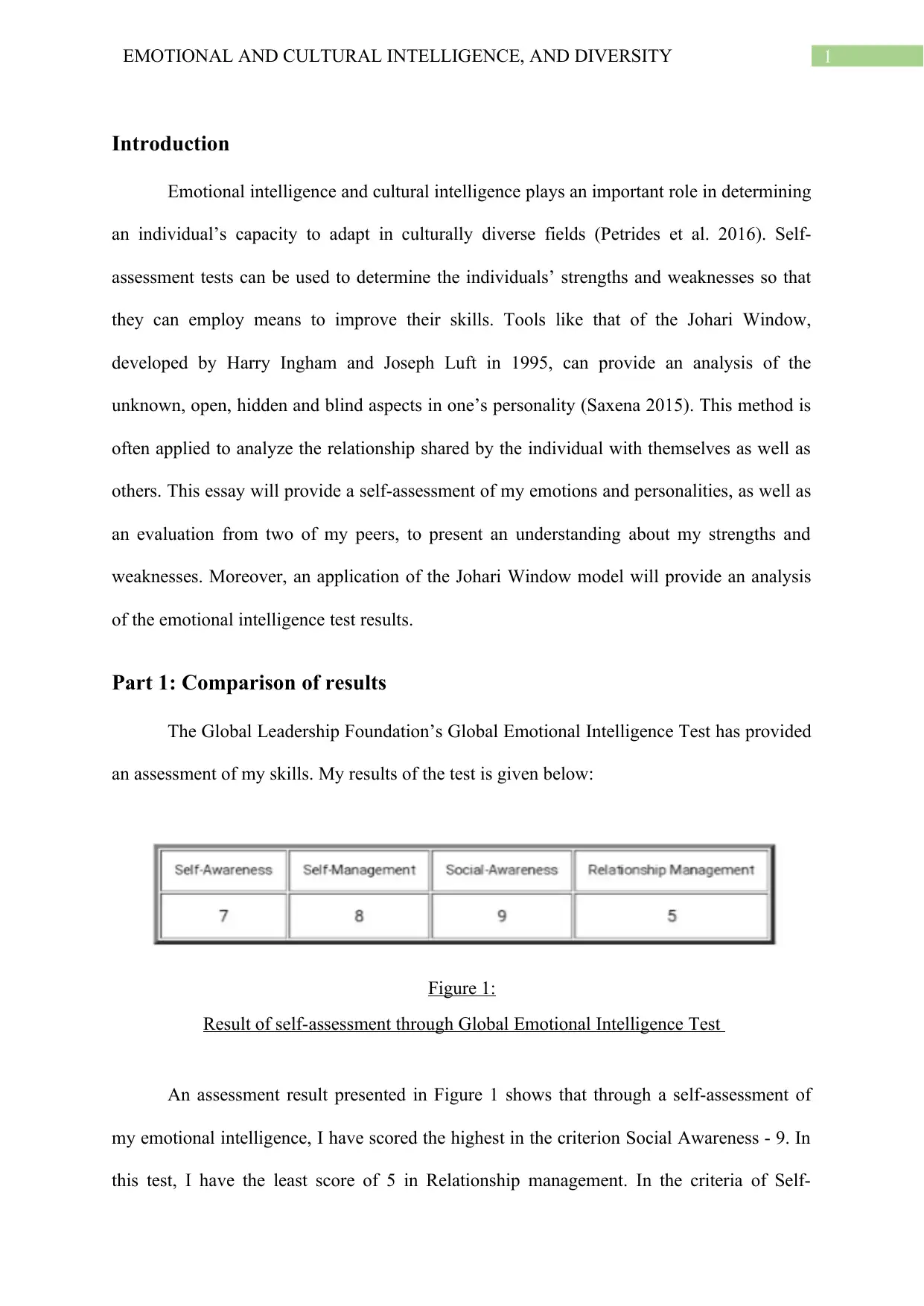
1EMOTIONAL AND CULTURAL INTELLIGENCE, AND DIVERSITY
Introduction
Emotional intelligence and cultural intelligence plays an important role in determining
an individual’s capacity to adapt in culturally diverse fields (Petrides et al. 2016). Self-
assessment tests can be used to determine the individuals’ strengths and weaknesses so that
they can employ means to improve their skills. Tools like that of the Johari Window,
developed by Harry Ingham and Joseph Luft in 1995, can provide an analysis of the
unknown, open, hidden and blind aspects in one’s personality (Saxena 2015). This method is
often applied to analyze the relationship shared by the individual with themselves as well as
others. This essay will provide a self-assessment of my emotions and personalities, as well as
an evaluation from two of my peers, to present an understanding about my strengths and
weaknesses. Moreover, an application of the Johari Window model will provide an analysis
of the emotional intelligence test results.
Part 1: Comparison of results
The Global Leadership Foundation’s Global Emotional Intelligence Test has provided
an assessment of my skills. My results of the test is given below:
Figure 1:
Result of self-assessment through Global Emotional Intelligence Test
An assessment result presented in Figure 1 shows that through a self-assessment of
my emotional intelligence, I have scored the highest in the criterion Social Awareness - 9. In
this test, I have the least score of 5 in Relationship management. In the criteria of Self-
Introduction
Emotional intelligence and cultural intelligence plays an important role in determining
an individual’s capacity to adapt in culturally diverse fields (Petrides et al. 2016). Self-
assessment tests can be used to determine the individuals’ strengths and weaknesses so that
they can employ means to improve their skills. Tools like that of the Johari Window,
developed by Harry Ingham and Joseph Luft in 1995, can provide an analysis of the
unknown, open, hidden and blind aspects in one’s personality (Saxena 2015). This method is
often applied to analyze the relationship shared by the individual with themselves as well as
others. This essay will provide a self-assessment of my emotions and personalities, as well as
an evaluation from two of my peers, to present an understanding about my strengths and
weaknesses. Moreover, an application of the Johari Window model will provide an analysis
of the emotional intelligence test results.
Part 1: Comparison of results
The Global Leadership Foundation’s Global Emotional Intelligence Test has provided
an assessment of my skills. My results of the test is given below:
Figure 1:
Result of self-assessment through Global Emotional Intelligence Test
An assessment result presented in Figure 1 shows that through a self-assessment of
my emotional intelligence, I have scored the highest in the criterion Social Awareness - 9. In
this test, I have the least score of 5 in Relationship management. In the criteria of Self-
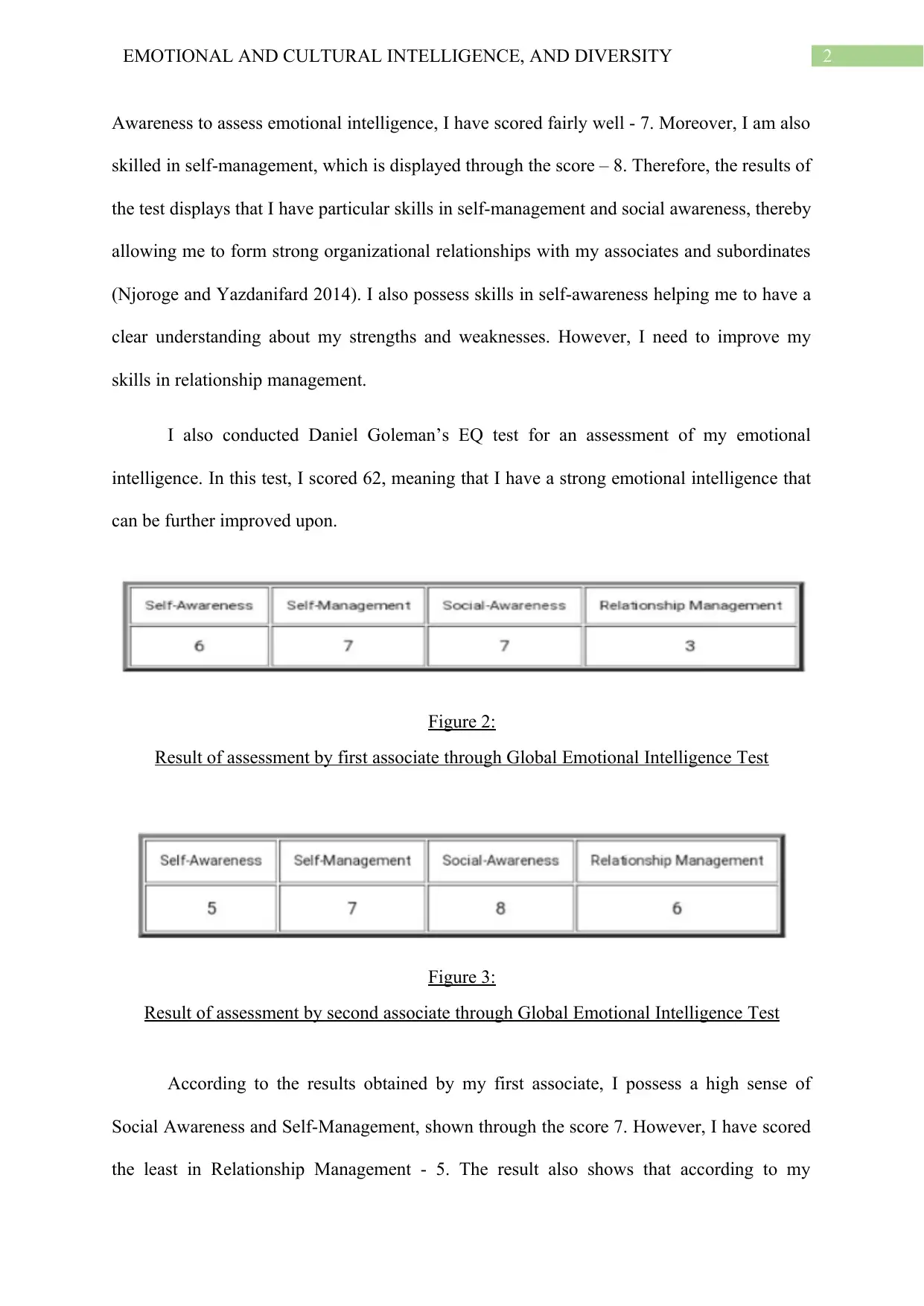
2EMOTIONAL AND CULTURAL INTELLIGENCE, AND DIVERSITY
Awareness to assess emotional intelligence, I have scored fairly well - 7. Moreover, I am also
skilled in self-management, which is displayed through the score – 8. Therefore, the results of
the test displays that I have particular skills in self-management and social awareness, thereby
allowing me to form strong organizational relationships with my associates and subordinates
(Njoroge and Yazdanifard 2014). I also possess skills in self-awareness helping me to have a
clear understanding about my strengths and weaknesses. However, I need to improve my
skills in relationship management.
I also conducted Daniel Goleman’s EQ test for an assessment of my emotional
intelligence. In this test, I scored 62, meaning that I have a strong emotional intelligence that
can be further improved upon.
The results of my peers in the GEIT is given below:
Figure 2:
Result of assessment by first associate through Global Emotional Intelligence Test
Figure 3:
Result of assessment by second associate through Global Emotional Intelligence Test
According to the results obtained by my first associate, I possess a high sense of
Social Awareness and Self-Management, shown through the score 7. However, I have scored
the least in Relationship Management - 5. The result also shows that according to my
Awareness to assess emotional intelligence, I have scored fairly well - 7. Moreover, I am also
skilled in self-management, which is displayed through the score – 8. Therefore, the results of
the test displays that I have particular skills in self-management and social awareness, thereby
allowing me to form strong organizational relationships with my associates and subordinates
(Njoroge and Yazdanifard 2014). I also possess skills in self-awareness helping me to have a
clear understanding about my strengths and weaknesses. However, I need to improve my
skills in relationship management.
I also conducted Daniel Goleman’s EQ test for an assessment of my emotional
intelligence. In this test, I scored 62, meaning that I have a strong emotional intelligence that
can be further improved upon.
The results of my peers in the GEIT is given below:
Figure 2:
Result of assessment by first associate through Global Emotional Intelligence Test
Figure 3:
Result of assessment by second associate through Global Emotional Intelligence Test
According to the results obtained by my first associate, I possess a high sense of
Social Awareness and Self-Management, shown through the score 7. However, I have scored
the least in Relationship Management - 5. The result also shows that according to my
⊘ This is a preview!⊘
Do you want full access?
Subscribe today to unlock all pages.

Trusted by 1+ million students worldwide
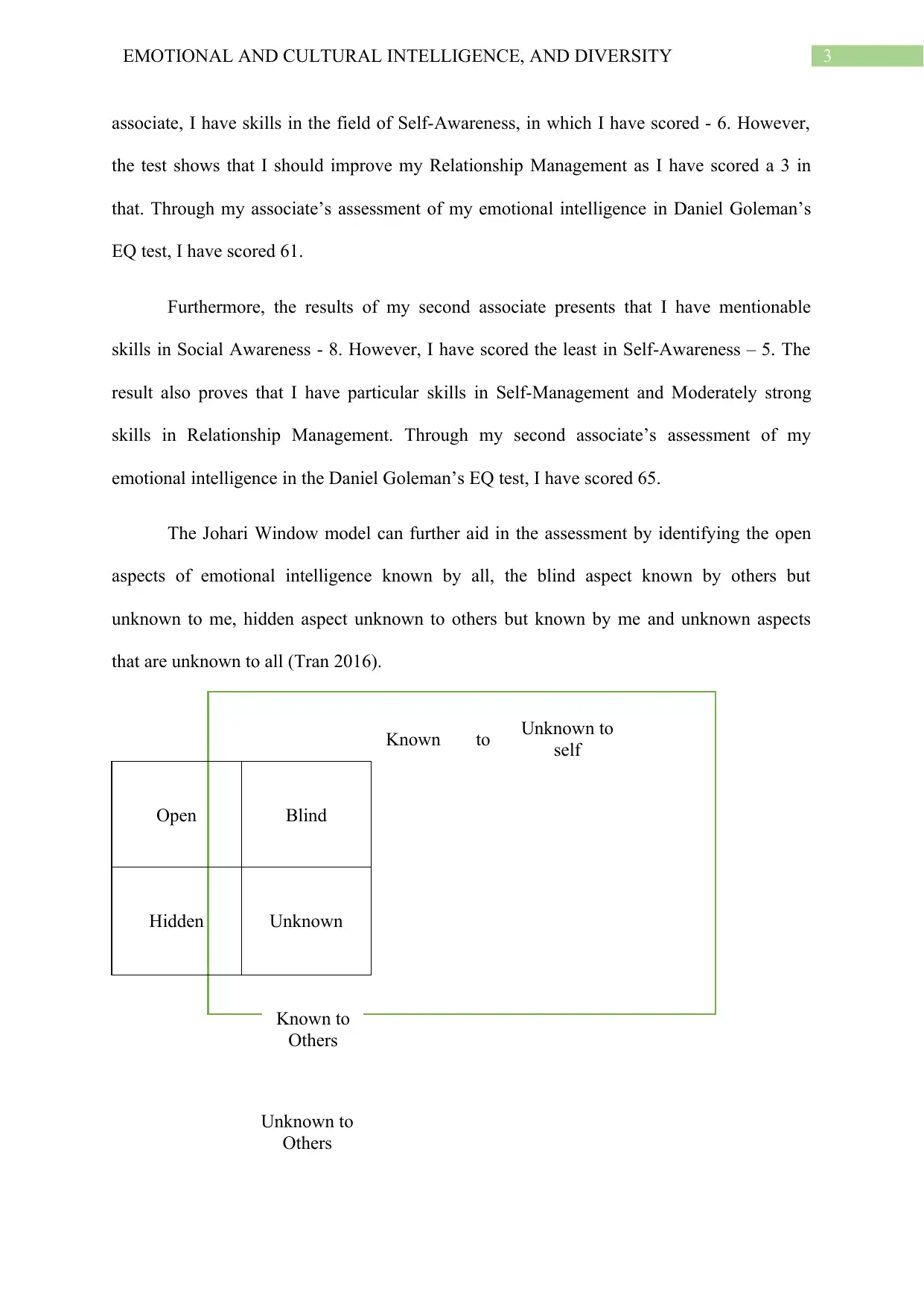
3EMOTIONAL AND CULTURAL INTELLIGENCE, AND DIVERSITY
associate, I have skills in the field of Self-Awareness, in which I have scored - 6. However,
the test shows that I should improve my Relationship Management as I have scored a 3 in
that. Through my associate’s assessment of my emotional intelligence in Daniel Goleman’s
EQ test, I have scored 61.
Furthermore, the results of my second associate presents that I have mentionable
skills in Social Awareness - 8. However, I have scored the least in Self-Awareness – 5. The
result also proves that I have particular skills in Self-Management and Moderately strong
skills in Relationship Management. Through my second associate’s assessment of my
emotional intelligence in the Daniel Goleman’s EQ test, I have scored 65.
The Johari Window model can further aid in the assessment by identifying the open
aspects of emotional intelligence known by all, the blind aspect known by others but
unknown to me, hidden aspect unknown to others but known by me and unknown aspects
that are unknown to all (Tran 2016).
Open Blind
Hidden Unknown
Known to
self
Unknown to
self
Known to
Others
Unknown to
Others
associate, I have skills in the field of Self-Awareness, in which I have scored - 6. However,
the test shows that I should improve my Relationship Management as I have scored a 3 in
that. Through my associate’s assessment of my emotional intelligence in Daniel Goleman’s
EQ test, I have scored 61.
Furthermore, the results of my second associate presents that I have mentionable
skills in Social Awareness - 8. However, I have scored the least in Self-Awareness – 5. The
result also proves that I have particular skills in Self-Management and Moderately strong
skills in Relationship Management. Through my second associate’s assessment of my
emotional intelligence in the Daniel Goleman’s EQ test, I have scored 65.
The Johari Window model can further aid in the assessment by identifying the open
aspects of emotional intelligence known by all, the blind aspect known by others but
unknown to me, hidden aspect unknown to others but known by me and unknown aspects
that are unknown to all (Tran 2016).
Open Blind
Hidden Unknown
Known to
self
Unknown to
self
Known to
Others
Unknown to
Others
Paraphrase This Document
Need a fresh take? Get an instant paraphrase of this document with our AI Paraphraser
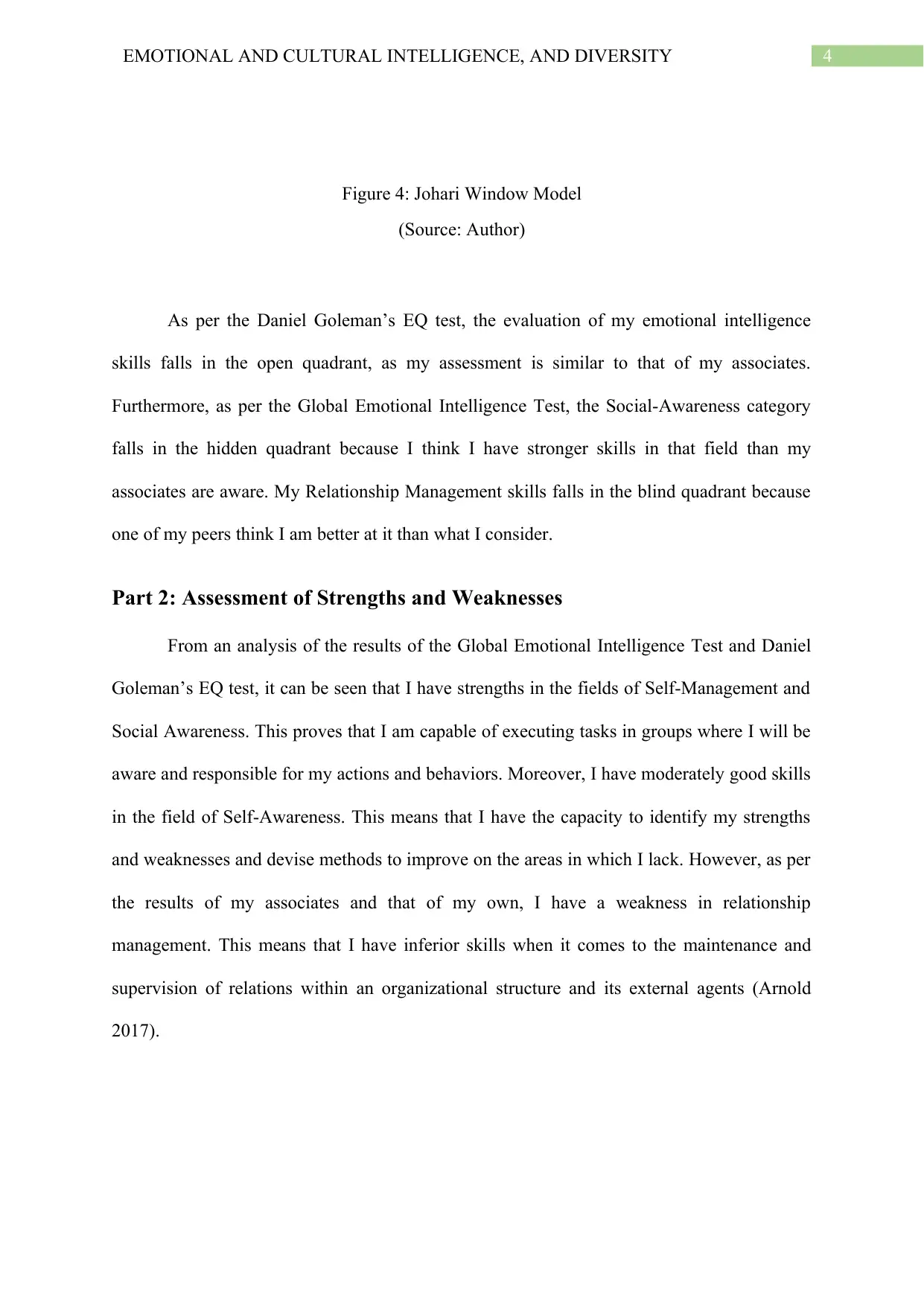
4EMOTIONAL AND CULTURAL INTELLIGENCE, AND DIVERSITY
Figure 4: Johari Window Model
(Source: Author)
As per the Daniel Goleman’s EQ test, the evaluation of my emotional intelligence
skills falls in the open quadrant, as my assessment is similar to that of my associates.
Furthermore, as per the Global Emotional Intelligence Test, the Social-Awareness category
falls in the hidden quadrant because I think I have stronger skills in that field than my
associates are aware. My Relationship Management skills falls in the blind quadrant because
one of my peers think I am better at it than what I consider.
Part 2: Assessment of Strengths and Weaknesses
From an analysis of the results of the Global Emotional Intelligence Test and Daniel
Goleman’s EQ test, it can be seen that I have strengths in the fields of Self-Management and
Social Awareness. This proves that I am capable of executing tasks in groups where I will be
aware and responsible for my actions and behaviors. Moreover, I have moderately good skills
in the field of Self-Awareness. This means that I have the capacity to identify my strengths
and weaknesses and devise methods to improve on the areas in which I lack. However, as per
the results of my associates and that of my own, I have a weakness in relationship
management. This means that I have inferior skills when it comes to the maintenance and
supervision of relations within an organizational structure and its external agents (Arnold
2017).
Figure 4: Johari Window Model
(Source: Author)
As per the Daniel Goleman’s EQ test, the evaluation of my emotional intelligence
skills falls in the open quadrant, as my assessment is similar to that of my associates.
Furthermore, as per the Global Emotional Intelligence Test, the Social-Awareness category
falls in the hidden quadrant because I think I have stronger skills in that field than my
associates are aware. My Relationship Management skills falls in the blind quadrant because
one of my peers think I am better at it than what I consider.
Part 2: Assessment of Strengths and Weaknesses
From an analysis of the results of the Global Emotional Intelligence Test and Daniel
Goleman’s EQ test, it can be seen that I have strengths in the fields of Self-Management and
Social Awareness. This proves that I am capable of executing tasks in groups where I will be
aware and responsible for my actions and behaviors. Moreover, I have moderately good skills
in the field of Self-Awareness. This means that I have the capacity to identify my strengths
and weaknesses and devise methods to improve on the areas in which I lack. However, as per
the results of my associates and that of my own, I have a weakness in relationship
management. This means that I have inferior skills when it comes to the maintenance and
supervision of relations within an organizational structure and its external agents (Arnold
2017).
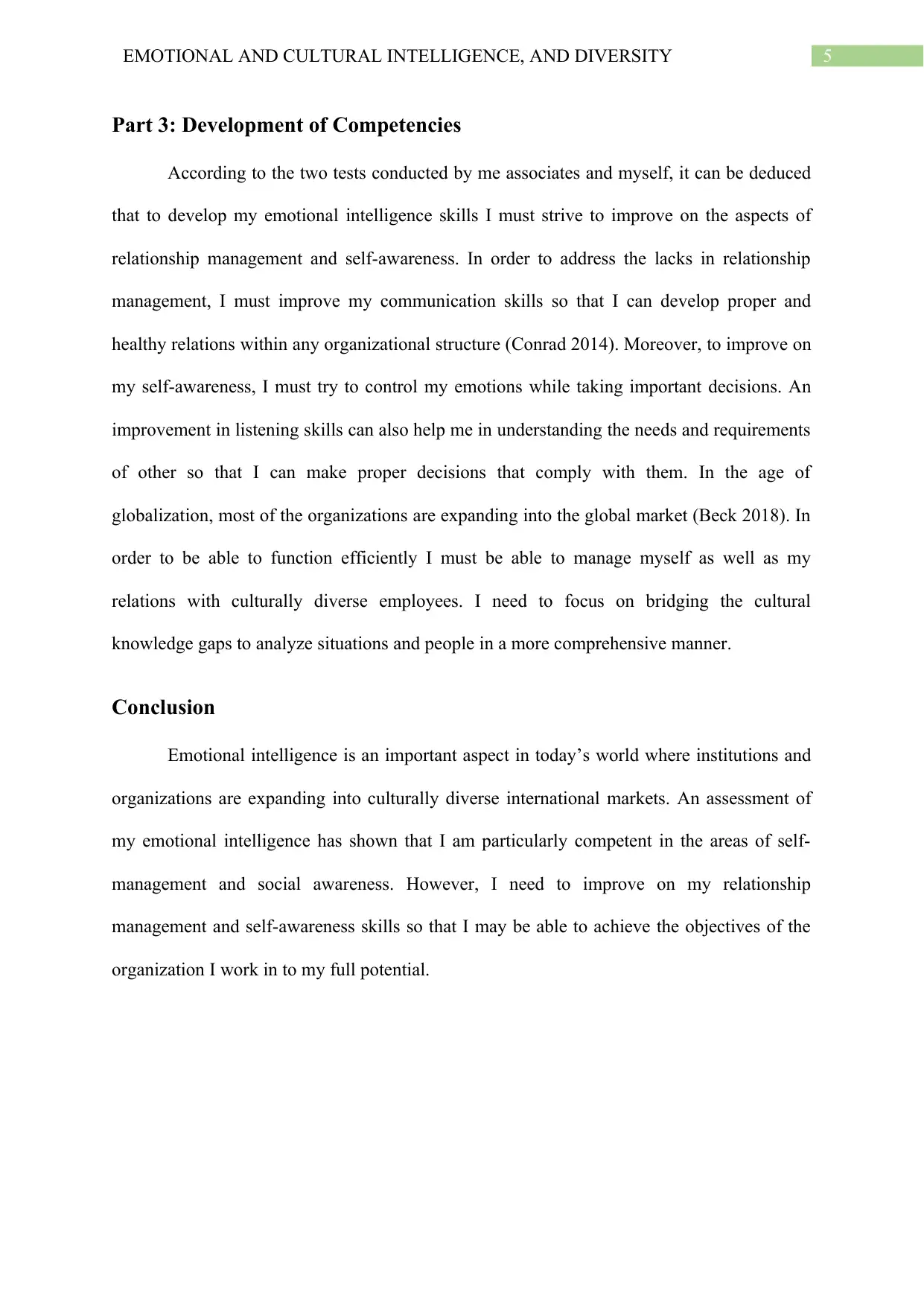
5EMOTIONAL AND CULTURAL INTELLIGENCE, AND DIVERSITY
Part 3: Development of Competencies
According to the two tests conducted by me associates and myself, it can be deduced
that to develop my emotional intelligence skills I must strive to improve on the aspects of
relationship management and self-awareness. In order to address the lacks in relationship
management, I must improve my communication skills so that I can develop proper and
healthy relations within any organizational structure (Conrad 2014). Moreover, to improve on
my self-awareness, I must try to control my emotions while taking important decisions. An
improvement in listening skills can also help me in understanding the needs and requirements
of other so that I can make proper decisions that comply with them. In the age of
globalization, most of the organizations are expanding into the global market (Beck 2018). In
order to be able to function efficiently I must be able to manage myself as well as my
relations with culturally diverse employees. I need to focus on bridging the cultural
knowledge gaps to analyze situations and people in a more comprehensive manner.
Conclusion
Emotional intelligence is an important aspect in today’s world where institutions and
organizations are expanding into culturally diverse international markets. An assessment of
my emotional intelligence has shown that I am particularly competent in the areas of self-
management and social awareness. However, I need to improve on my relationship
management and self-awareness skills so that I may be able to achieve the objectives of the
organization I work in to my full potential.
Part 3: Development of Competencies
According to the two tests conducted by me associates and myself, it can be deduced
that to develop my emotional intelligence skills I must strive to improve on the aspects of
relationship management and self-awareness. In order to address the lacks in relationship
management, I must improve my communication skills so that I can develop proper and
healthy relations within any organizational structure (Conrad 2014). Moreover, to improve on
my self-awareness, I must try to control my emotions while taking important decisions. An
improvement in listening skills can also help me in understanding the needs and requirements
of other so that I can make proper decisions that comply with them. In the age of
globalization, most of the organizations are expanding into the global market (Beck 2018). In
order to be able to function efficiently I must be able to manage myself as well as my
relations with culturally diverse employees. I need to focus on bridging the cultural
knowledge gaps to analyze situations and people in a more comprehensive manner.
Conclusion
Emotional intelligence is an important aspect in today’s world where institutions and
organizations are expanding into culturally diverse international markets. An assessment of
my emotional intelligence has shown that I am particularly competent in the areas of self-
management and social awareness. However, I need to improve on my relationship
management and self-awareness skills so that I may be able to achieve the objectives of the
organization I work in to my full potential.
⊘ This is a preview!⊘
Do you want full access?
Subscribe today to unlock all pages.

Trusted by 1+ million students worldwide
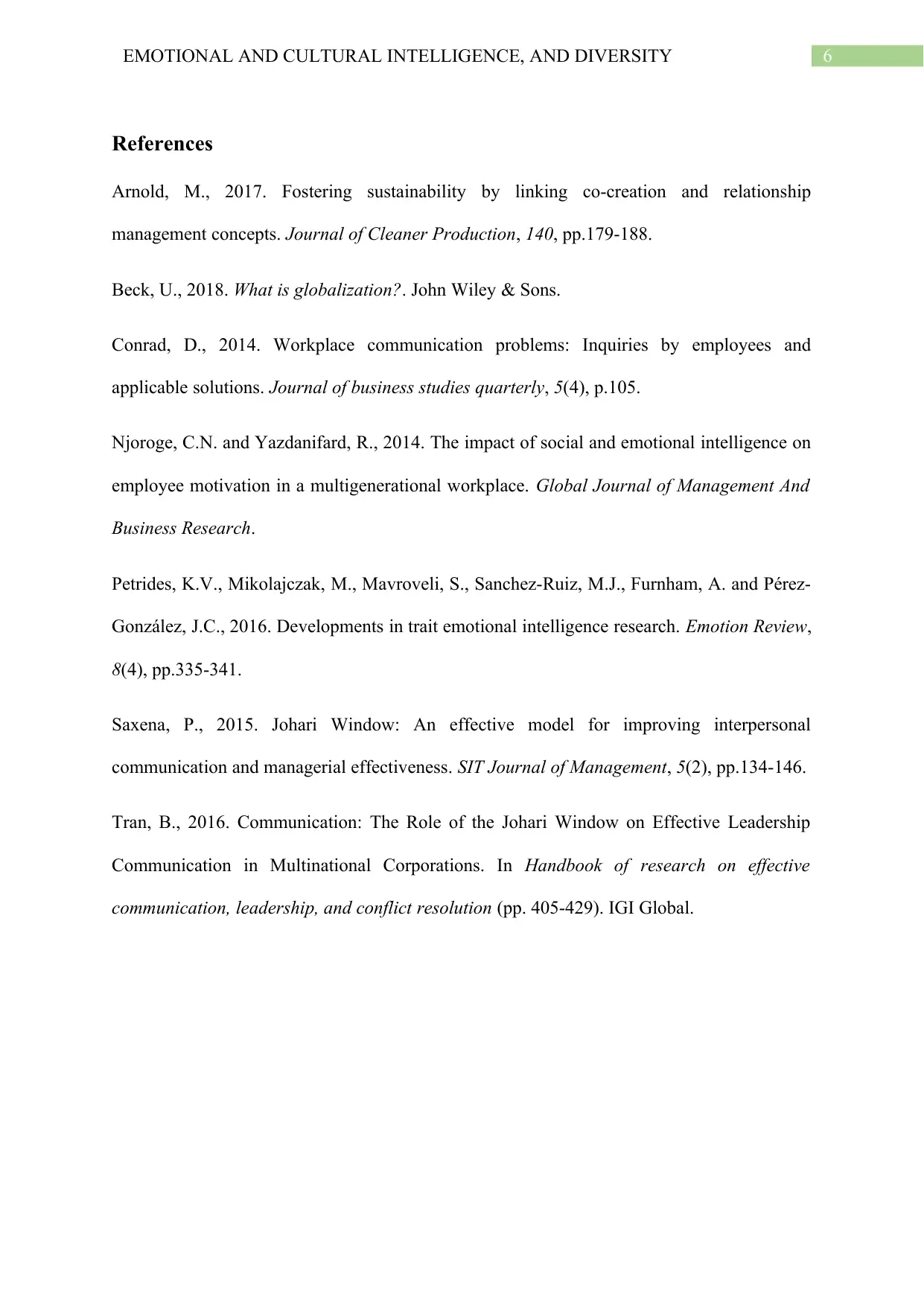
6EMOTIONAL AND CULTURAL INTELLIGENCE, AND DIVERSITY
References
Arnold, M., 2017. Fostering sustainability by linking co-creation and relationship
management concepts. Journal of Cleaner Production, 140, pp.179-188.
Beck, U., 2018. What is globalization?. John Wiley & Sons.
Conrad, D., 2014. Workplace communication problems: Inquiries by employees and
applicable solutions. Journal of business studies quarterly, 5(4), p.105.
Njoroge, C.N. and Yazdanifard, R., 2014. The impact of social and emotional intelligence on
employee motivation in a multigenerational workplace. Global Journal of Management And
Business Research.
Petrides, K.V., Mikolajczak, M., Mavroveli, S., Sanchez-Ruiz, M.J., Furnham, A. and Pérez-
González, J.C., 2016. Developments in trait emotional intelligence research. Emotion Review,
8(4), pp.335-341.
Saxena, P., 2015. Johari Window: An effective model for improving interpersonal
communication and managerial effectiveness. SIT Journal of Management, 5(2), pp.134-146.
Tran, B., 2016. Communication: The Role of the Johari Window on Effective Leadership
Communication in Multinational Corporations. In Handbook of research on effective
communication, leadership, and conflict resolution (pp. 405-429). IGI Global.
References
Arnold, M., 2017. Fostering sustainability by linking co-creation and relationship
management concepts. Journal of Cleaner Production, 140, pp.179-188.
Beck, U., 2018. What is globalization?. John Wiley & Sons.
Conrad, D., 2014. Workplace communication problems: Inquiries by employees and
applicable solutions. Journal of business studies quarterly, 5(4), p.105.
Njoroge, C.N. and Yazdanifard, R., 2014. The impact of social and emotional intelligence on
employee motivation in a multigenerational workplace. Global Journal of Management And
Business Research.
Petrides, K.V., Mikolajczak, M., Mavroveli, S., Sanchez-Ruiz, M.J., Furnham, A. and Pérez-
González, J.C., 2016. Developments in trait emotional intelligence research. Emotion Review,
8(4), pp.335-341.
Saxena, P., 2015. Johari Window: An effective model for improving interpersonal
communication and managerial effectiveness. SIT Journal of Management, 5(2), pp.134-146.
Tran, B., 2016. Communication: The Role of the Johari Window on Effective Leadership
Communication in Multinational Corporations. In Handbook of research on effective
communication, leadership, and conflict resolution (pp. 405-429). IGI Global.
1 out of 7
Related Documents
Your All-in-One AI-Powered Toolkit for Academic Success.
+13062052269
info@desklib.com
Available 24*7 on WhatsApp / Email
![[object Object]](/_next/static/media/star-bottom.7253800d.svg)
Unlock your academic potential
Copyright © 2020–2026 A2Z Services. All Rights Reserved. Developed and managed by ZUCOL.





